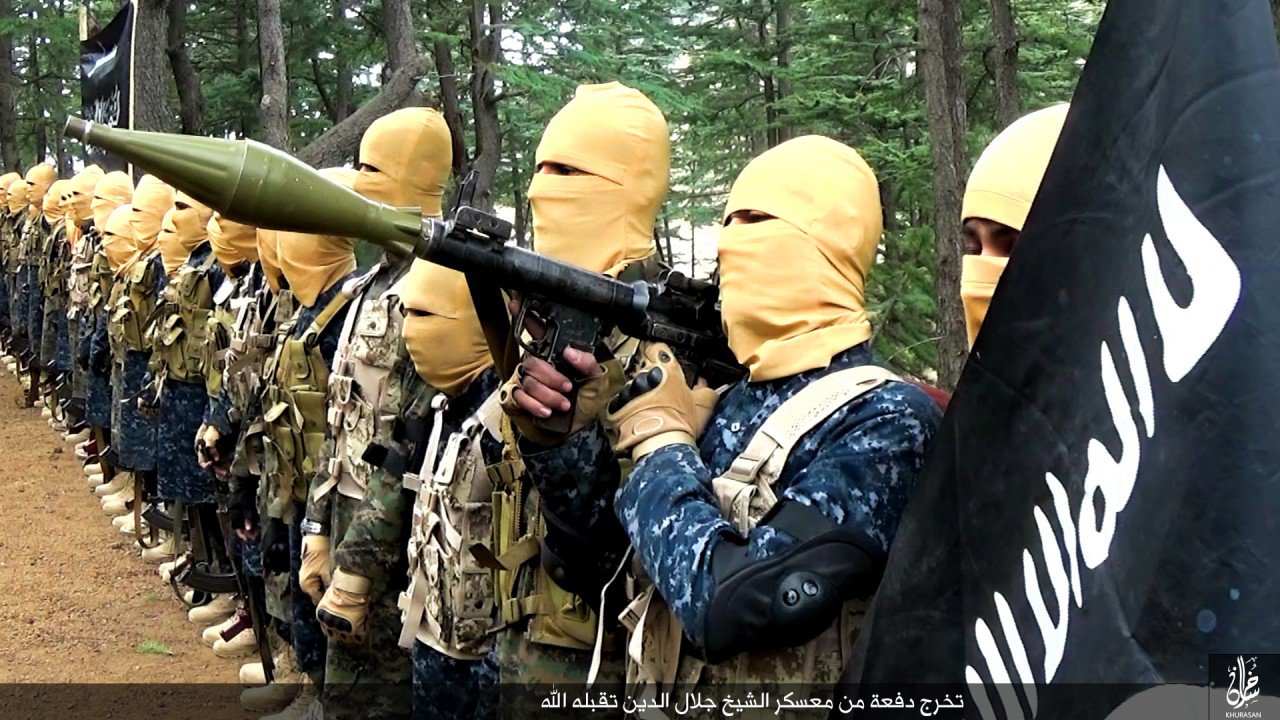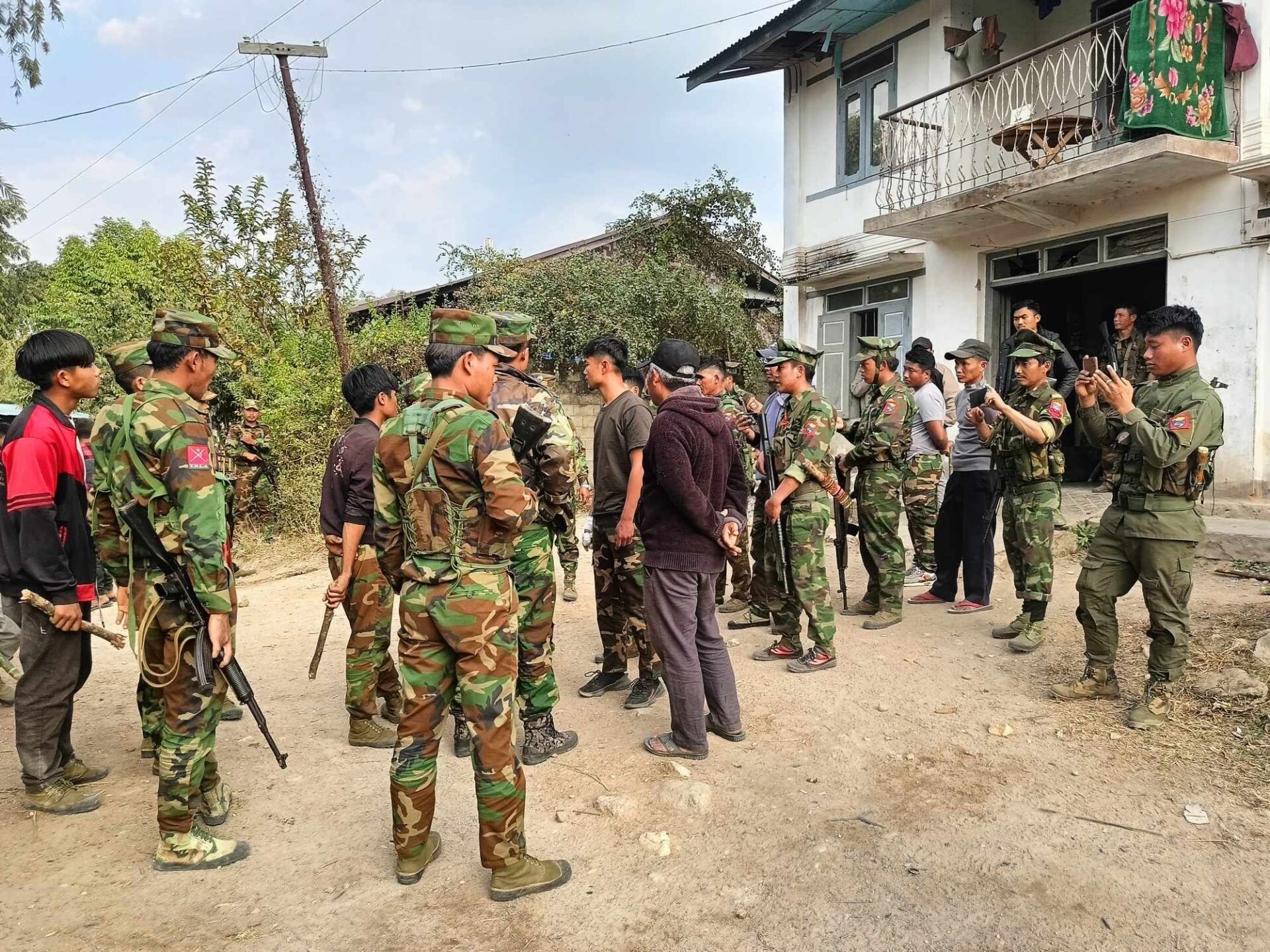
The Tribal Factor in Syria’s Rebellion: A Survey of Armed Tribal Groups in Syria
The Tribal Factor in Syria’s Rebellion: A Survey of Armed Tribal Groups in Syria
Tribalism remains a primary form of communal identity among Arab Sunnis across Syria, regardless of whether they live in rural or urban areas. As a powerful source of socio-political mobilization, Syrian Arab tribalism has shaped the conflict since the first demonstrations against the al-Assad government were led by disaffected tribesmen in the northeastern city of al-Hasakah in February 2011. The popular anger mobilized in Dera’a governorate by inter-tribal activist networks of mainly young and displaced tribesmen over the arrest and murder of two tribal youths fueled a national uprising (for Syrian Arab tribal networks, see Terrorism Monitor, June 1, 2012). Currently, Syrian Arab tribal groups are active participants in pro and anti-Assad militias, as soldiers in the Syrian military and as members of tribally-organized militias that are concerned with protecting their tribe and its autonomy from both the Syrian state and the armed opposition.
Of particular concern in the context of Syria’s civil war is the possibility of an alliance, however temporary, between Syria’s Arab tribes and militant Salafist groups such as the al-Qaeda affiliated Jabhat al-Nusra (Victory Front). In the north-eastern governorates of al-Raqqa, al-Hasakah and Deir al-Zor collectively referred to as al-Jazirah (bordering Turkey to the north and Iraq to the east), the majority Arab Sunni tribal population coexists uneasily with groups such as Jabhat al-Nusra that have a strong presence in the region. A tribal shaykh of a major tribal confederation in the area asserted that, without international support, Syrian tribes would do what they had to do to protect their assets, including working with militant Salafist groups or even Iran. [1]
Syrian Arab Tribes and Tribal Organization in the Civil War
Syrian Arab tribes are divided into qabila (national and trans-national tribal confederations) and ‘ashira (individual tribes). ‘Ashira are further divided into fukhud (clans), khums or ibn ‘amm (lineages) and, at the lowest level, al–bayt or aa’ila (extended families). Due to the geographically dispersed and localized nature of the Syrian conflict, Syrian tribal armed groups, like other participants in the civil war, generally participate in fighting near their home areas. In spite of the generally localized nature of mobilization of armed groups in the Syrian civil war, there is a clear distinction of scale and group solidarity that differentiates a tribal ‘ashira from a tribal qabila, the main units of organization that tribal armed groups have displayed thus far in the conflict.
Although they may occasionally be referred to as qabila and include fellow tribesmen from Syria’s neighboring countries, ‘ashira are usually present and powerful only in a particular region within Syria. Such ‘ashira include al-Haddadine in the northwestern Aleppo and Idlib governorates, al-Muwali in Idlib governorate, al-Damaakhla in Idlib, Hama, Aleppo, and Raqqa governorates, the Bani Khalid in the central-western Homs and Hama governorates and al-Zoubi in the southern Dera’a governorate and across the border into northern Jordan.
The Bani Khalid and al-Muwali ‘ashira have active fighters in the armed opposition and exemplify the role of a local ‘ashira in the fighting in western Syria. Several battalions of Bani Khalid fighters who are aligned with the armed opposition’s umbrella group, the Free Syrian Army (FSA), continue to participate in the fighting for the city of Homs and its suburbs. [2] The ‘Shield Brigade’ of the Bani Khalid in Hama governorate is also a constituent fighting force of the western Syrian umbrella armed opposition group, the Front of Syrian Revolutionaries. [3] Al-Muwali tribesmen are fighting against the Syrian military in the vicinity of the large town of Ma’rat Numan, south of the city of Idlib, where the tribe is present in large numbers. They are active in the fight for the control of the town and the nearby Syrian military base of Wadi al-Dayf. [4]
Three armed opposition battalions that claim to be tribal but are without a specifically stated tribal affiliation have been active in western Syria. One of these groups is called the Battalion of the Free Tribes, which, like the al-Muwali and the al-Damaakhla, is active around the town of Mar’at Numan, participating in the fight for control of Wadi al-Dayf. This group is also associated with the Syrian nationalist, Sunni Islamist umbrella armed opposition group, Alwiya Ahfaad al-Rasul (Descendants of the Prophet). [5] Another tribal battalion, the Free Tribes of al-Sham, was organized in Dera’a in February and claims to have been formed by defecting Syrian soldier tribesmen from Dera’a, Aleppo, al-Raqqa, al-Haskah and Deir al-Zor governorates. The Free Tribes of al-Sham are a battalion of the al-Omari Brigades, an Alwiya Ahfaad al-Rasul affiliate in Dera’a. [6] Another coalition of tribal militias composed of many Syrian army defectors, calling itself the Front of the Syrian Tribes, was formed in Aleppo in April. [7]
Syrian Tribal Qabila in the Civil War
The largest qabila in Syria, particularly the Ougaidat, Baggara and Shammar, are transnational tribal confederations that have constituent clans throughout the country. These qabila are, however, present in the greatest numbers in the Jazirah region. Some qabila in Syria, such as the ‘Anaza of Homs governorate, the Ta’ie of al-Hasakah governorate, and the Na’im are present in Syria in smaller numbers than in neighboring states. Of these smaller qabila, al-Na’im is the largest and some al-Na’im tribesmen have raised an opposition brigade in the Damascus countryside. [8]
The qabila of the Ougaidat is emerging as one of the most active tribally organized, armed anti-Assad coalitions. Ougaidat fighting groups, organized on the local level, are part of a national tribal coalition that calls itself the Ougaidat Tribe Brigades. These brigades are very active in Homs governorate in and around the small city of al-Rastan north of Homs and in Deir al-Zor governorate, where they have particular strength inside and south of the city of Deir al-Zor in a belt of communities that includes the towns of Mayadin and Abu Kamal on the Iraqi border. Ougaidat brigades also participate in the fighting around the northwestern city of Idlib near the Turkish border. [9]
The Ougaidat have also been active participants in an opposition exile group, the Council of the Arab Tribes in Syria. Several prominent members of the Syrian opposition are Ougaidat tribesmen, including Shaykh Nawaf al-Faris, the former Syrian Ambassador to Iraq; Syria’s first astronaut, Major General Muhammad Faris; the Chairman of the FSA Military Council of Aleppo, Colonel Abd al-Jabbar al-‘Aqeedi; and the former Chairman of the Latakia Political Security Branch, General Nabil al-Fahad al-Dundal. [10]
There are also challenges that confront effective intra-tribal coordination and unity in Syria that are caused by geographic dispersal inside the country and internal divisions created by local power realities in a particular governorate. Our research indicates that the most pronounced example of intra-tribal divisions in the conflict occurs within the Baggara tribal confederation. Baggara tribesmen participate in armed activities both in support of and against the opposition. The Baggara were particularly hard-hit by the Syrian Ba’ath Party’s policy of undermining tribal autonomy and the economic deprivation caused by the decade-long drought that devastated Syria’s rural, agriculture-dependent regions.
Baggara tribesmen are also religiously divided by the conversion to Shi’ism of a reported quarter of the Baggara confederation in villages south of Aleppo as a result of Iranian-funded proselytization (see Terrorism Monitor, June 1, 2012; September 15, 2011). Tribal leaders from the Shammar and Ougaidat confederations offered a cultural explanation for the Baggara’s lack of internal tribal coherence and Sunni to Shiite conversions by suggesting they were the result of the Baggara’s roots as a sheep or goat-herding tribe and not a “noble” camel-herding tribe. [11] In Aleppo, Baggara fighters are reported to work with the Syrian military to attack opposition controlled neighborhoods in the city, and Syrian opposition fighters also claim to have fought Baggara tribesmen supporting the Syrian military during a battle fought to free prisoners held at the Aleppo Central Prison. [12]
Overall leadership of the Baggara was at one point claimed by Shaykh Nawaf Raghib al-Bashir, the son of the now deceased former paramount Shaykh of the Baggara. Shaykh al-Bashir, who was one of the prominent opposition figures who signed the 2005 reformist Damascus Declaration, was jailed by the Syrian government in 2011 and reportedly forced to issue a statement in support of President Bashar al-Assad (al-Sharq al-Awsat, January 18, 2012). Following his defection to Turkey, Shaykh al-Bashir became a prominent leader within the Council of the Arab Tribes in Syria and the leader of the Jazirah and Euphrates Front to Liberate Syria (al-Safir [Beirut], February 21).
The Jazirah and Euphrates Front to Liberate Syria is an opposition organization that, according to Shaykh al-Bashir, consists of approximately 138 armed opposition battalions and brigades in the Jazirah region that coordinate closely with the FSA’s Supreme Military Command but are autonomous from the National Coalition for Syrian Revolutionary and Opposition Forces and the Syrian National Council (Zaman al-Wasl [Homs], March 23). Shaykh al-Bashir is also said to have personal command of approximately 500 to 3,000 armed fighters organized into fighting groups that are reportedly organized under Alwiya Ahfaad al-Rasul’s umbrella in areas of northern al-Raqqa and al-Hasakah governorates. [13]
Anti-Kurdish Militancy
Shaykh al-Bashir has organized several armed groups that have actively sought to attack Kurds in and around the ethnically mixed city of Ras al-‘Ayn in the northeastern area of al-Hasakah governorate along the Turkish border (National [Dubai], January 30). Pro-government Baggara fighters, without links to Shaykh al-Bashir, are also stated to have participated in attacks against the Kurdish Partiya Yekitiya Demokrat (PYD – Democratic Union Party) in the ethnically mixed northern Aleppo neighborhood of Shaykh Maqsud (Welati.info, May 11, 2012). The participation of Baggara tribal fighters in attacks against Kurds demonstrates the continuingly fragile state of Kurdish and Arab tribal relations in ethnically mixed regions such as Aleppo and al-Jazirah (see Terrorism Monitor, June 1, 2012).
The cities of al-Hasakah and Qamishli in the northeastern area of the governorate of al-Hasakah near the borders with Turkey and Iraqi Kurdistan have emerged as a site of conflict between Arab tribes and Kurds. In Qamishli, members of the Ta’ie tribe have been organized into pro-Assad “Popular Committees” under the command of the Syrian MP and Ta’ie Shaykh Muhammad Fares and are reported to have engaged in several clashes with Kurdish fighters from the PYD [All4Syria, November 30, 2012]. However, local Arab tribal leaders and Kurdish notables who grew up together have formed a joint council in Qamishli to avoid such conflict. The conflict on the Kurdish side is generated by individuals and groups linked to the PYD. [14]
Conclusion
Tribal identity is used in restive areas of Syria to mobilize and direct the armed activities of tribesmen in support of both the government and the opposition. Further, tribal identity (even where dormant, as is often the case in major cities) will, as occurred in Iraq, assert itself more prominently among Arab Sunnis across Syria as the country further destabilizes, including in the major urban areas of western Syria such as Aleppo and Damascus. Tribalism is a socio-cultural fact throughout Syria, not just in the less developed eastern governorates of the country. It is an important form of traditional civil society that will help determine the success of local or foreign-supported security arrangements, affect good governance and impact the sustainability of long-term stability operations and economic development throughout the country. As anti-Assad states in the international community debate options for implementing potential post-Assad stability operations, Syrian Arab tribes will be a critical part of this effort.
Carole A. O’Leary is a Visiting Scholar at the Columbus School of Law’s Program in Law & Religion within the Catholic University of America (CUA).
Nicholas A. Heras is an independent analyst and consultant on Middle East issues and a former David L. Boren Fellow.
Notes
1. Skype Interview with a Syrian tribal leader. February 21, 2013.
2. “Ugarit Homs: Beni Khalid Tribe Forms a Battalion.” Posted on Ugarit News Channel YouTube page. February 14, 2012. https://www.youtube.com/watch?v=J2jYjyQGgsM
3. “Ugarit Hama: Bani Khalid Shield Brigades Announces the Formation on the Battalion Beni Khaled Shakhsbo-1/25,” January 27, 2012, https://www.youtube.com/watch?v=stWmKn_zVa0
4. “Formation of the Freemen of the al-Muwali Battalion-Ma’rat Numan Countryside.” February 16, 2012, https://www.youtube.com/watch?NR=1&v=_5A9HT_tOEg&feature=endscreen; “Idlib – Announcement of the Formation of a Battalion from the al-Muwali Tribe,” February 3, 2012, https://www.youtube.com/watch?v=RbSu6cug4K8;
5. “Alwiya Ahfaad al-Rasul in Idlib: ‘Brigade of the Free Tribes.’” Alwiya Ahfaad al-Rasul website, https://ahfadalrasoul.com/index.php?p=arround; “A Break for Elements of the Brigade of the Free Tribes near Wadi al-Dayf,” https://www.youtube.com/watch?v=WZ-ZjRSvZaU
6. “Assurance of Split: Battalion of the Free Tribes of al-Sham.” Posted on the Battalion of the Free Tribes of al-Sham Facebook Page. May 29, 2013. https://www.facebook.com/Algahfree/posts/130879683782266; “Formation of the Battalion of the Free Tribes of al-Sham: al-Omari Brigade in Dera’a.” Posted on the YouTube page of a user with the screen name TheThawra1, February 26, 2013, https://www.youtube.com/watch?v=qix4ZHPzyPU
7. “Formation of the Free Tribes of Syria,” Ugarit News YouTube page. April 8, 2013. https://www.youtube.com/watch?v=pTgAuJhGfBs
8. “Formation of the Brigade of the Fighting Na’im Tribe in Syria.” Posted on the YouTube page of a user with the screen name golaney. November 13, 2012, https://www.youtube.com/watch?feature=player_embedded&v=HCgmnSSPjnY
9. “Ougaidat Tribe Revolutionaries in Syria: ‘Ayaal al-Abraz.’” A compilation of Ougaidat armed opposition group videos that were posted on the YouTube page of an Ougaidat tribesman with the screen name “Ogaidy Abraz” on May 15, 2013, https://www.youtube.com/watch?v=IbuyVtsDHPc
10. Ibid.
11. Interviews with Syrian Arab shaykhs and tribal youth from the Shammar, Ougaidat, Ta’ie, and Baggara tribes, conducted between May 2008 and January 2011.While Arab tribes that are recognized by Arabs as legitimate have their origins in pre-Islamic Arabia, Arab tribes differentiate between those that claim noble status based on their camel-herding origins (al-Bedu) versus those of lower status, associated with sheep and goat herding (al-Shwaya). In the case of Syria, the Shammar, ‘Anaza, and Ta’ie fall into the first category, and the Ougaidat, Baggara, and Jabbour fall into the second. The Baggara and Ougaidat are mostly limited to Syria, with smaller numbers in Iraq and even fewer in Jordan and the GCC states. The Shammar, Jabbour, ‘Anaza, and Ta’ie have a significant presence in Iraq and Saudi Arabia and are found in smaller numbers in the GCC states and Jordan. Al-Na’im, a highly decentralized tribal confederation without a clearly defined leadership, is found mainly in Syria with a smaller presence in the GCC states.
12. “Halab: Battle Progress to Free Prisoners from the al-Baggara Division.” April 10, 2013. AENNetwork Aleppo and Idlib, https://www.youtube.com/watch?v=8ZGvj-qDBCg; “Halab: Battle to Free Prisoners-Targeting the al-Baggara Division with Machine Gun.” April 11. Posted on the YouTube page of a user with the screen name ksa4cools, https://www.youtube.com/watch?v=lrOdCjb4S1g
13. Information based on private communication with Dr. Omar Shaykhmous, independent analyst and former advisor to Iraqi President Jalal al-Talabni, originally from the al-Jazirah region of Syria.
14. Interviews conducted over Skype and email with concerned Arab Sunni tribal leaders and Kurds from the al-Jazirah region, particularly the areas around the cities of al-Hasakah and Qamishli, between June 2012 and June 2013.


